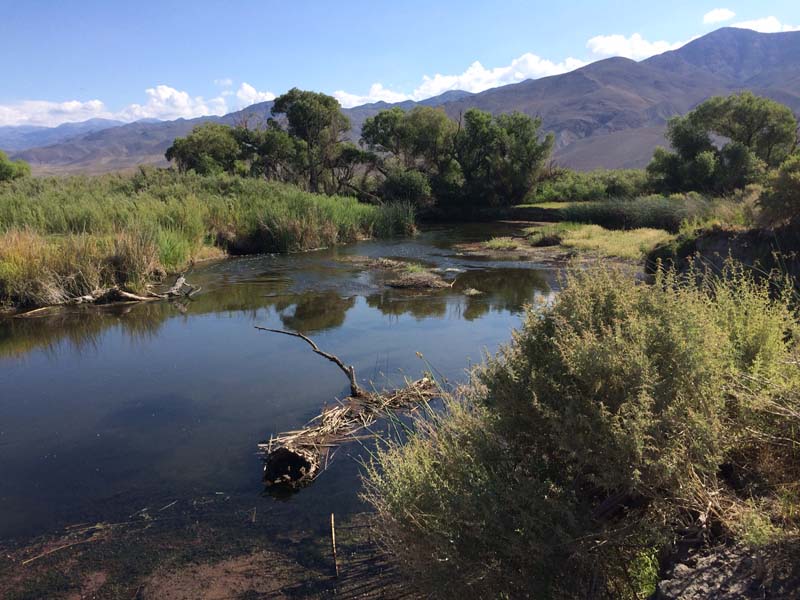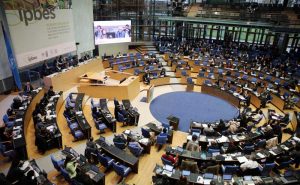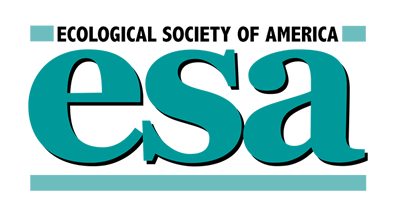Science Programs
Our Science Office staff carry out a broad range of activities in support of the ESA membership, the scientific community, and public agency scientists and decision makers.
Advancing Ecological Science
For the past 23 years, ESA’s Office of Science Programs has provided support for the ESA Panel on Vegetation Classification. During this time, the Panel has developed the complete scientific content of the US National Vegetation Classification (USNVC).The USNVC made its debut in February 2016, marking the culmination of two decades of dedicated effort from the USNVC Partnership and the ESA Panel on Vegetation Classification. It is the first dynamic classification, designed to adapt as new ecological knowledge becomes available. The ESA Panel has worked to ensure the scientific rigor of the classification and facilitate its development, collaborating with other organizations and agencies in the USNVC Partnership, including the US Forest Service, USGS Core Science Systems, NatureServe, and the Federal Geographic Data Committee Vegetation Subcommittee. The Panel also maintains VegBank, the USNVC open-access vegetation plot database.
Scientists collect field data used to update VegBank.
Ecology for Community
Sustaining Biological Infrastructure
In 2014, ESA’s Science Program launched the Sustaining Biological Infrastructure (SBI) training initiative with NSF support to give scientists the business planning, marketing, and communication skills necessary to innovate and sustain research infrastructure.  From June 21-23, 2016, ESA held its third “Sustaining Biological Infrastructure: Strategies for Success” course. Twelve leaders of biological infrastructure projects (including digital data resources, field stations, labs, and collections) spent three days growing their skills in financial management, planning, and communication. The course was a resounding success with participants reporting increased confidence levels in skills such as understanding and communicating financial information, putting together a business plan, communicating with stakeholders, and approaching private funding sources. Science staff have submitted a proposal to NSF to enhance and continue the SBI initiative for another three years.
From June 21-23, 2016, ESA held its third “Sustaining Biological Infrastructure: Strategies for Success” course. Twelve leaders of biological infrastructure projects (including digital data resources, field stations, labs, and collections) spent three days growing their skills in financial management, planning, and communication. The course was a resounding success with participants reporting increased confidence levels in skills such as understanding and communicating financial information, putting together a business plan, communicating with stakeholders, and approaching private funding sources. Science staff have submitted a proposal to NSF to enhance and continue the SBI initiative for another three years.
Issues in Ecology
Produced by the Science Office, Issues in Ecology uses commonly understood language to report the consensus of a panel of scientific experts on issues related to the environment. The audience for Issues in Ecology includes decision-makers at all levels.
Issues in Ecology #19, “Investing in Citizen Science Can Improve Natural Resource Management and Environmental Protection,” was published in September 2015. Duncan McKinley (USDA Forest Service) and Abraham Miller-Rushing (National Park Service) led the development of this Issue, which examines the current use of citizen science in ecology and the environmental sciences in the United States and describes how organizations might benefit from it. The Issue was included in the new Federal Crowdsourcing and Citizen Science Toolkit, which is intended to help federal agencies design, carry out, and manage citizen science and crowdsourcing projects.
Issues in Ecology #20, “Species Recovery in the United States: Increasing the Effectiveness of the Endangered Species Act,” was published in January 2016. Dan Evans, a AAAS Science and Technology Policy Fellow, led the development of the Issue, which reflects on endangered species recovery since the passage of the Endangered Species Act.
Owens Valley Review and Design of Vegetation Monitoring & Analytical Methods
 The Science Office assisted the Los Angeles Department of Water and Power (LAWDP) and Inyo County, CA with a review of the vegetation monitoring and analytical methods that they use to assess impacts of groundwater pumping in the Owens Valley, CA. ESA’s Science Office submitted the final report, “Review of Methods for Vegetation Monitoring and Analysis in the Owens Valley, California” to Inyo County and LADWP in February 2016. The report was prepared by a panel of three experts chosen by ESA—Scott Abella (UNLV), Charles Bonham (Colorado State University emeritus), and James Thorpe (UC Davis)—led by Cliff Duke, director of science, and supported by Kim Quach.
The Science Office assisted the Los Angeles Department of Water and Power (LAWDP) and Inyo County, CA with a review of the vegetation monitoring and analytical methods that they use to assess impacts of groundwater pumping in the Owens Valley, CA. ESA’s Science Office submitted the final report, “Review of Methods for Vegetation Monitoring and Analysis in the Owens Valley, California” to Inyo County and LADWP in February 2016. The report was prepared by a panel of three experts chosen by ESA—Scott Abella (UNLV), Charles Bonham (Colorado State University emeritus), and James Thorpe (UC Davis)—led by Cliff Duke, director of science, and supported by Kim Quach.
Collaboration
Science Program staff participate in the scientific community to highlight ESA capabilities and those of our members. Staff also serve on the National Research Council’s Board on Research Data and Information, the Steering Committee for the Sustainable Rangelands Roundtable, the AAAS Science and Human Rights Coalition, the Advisory Committee on Climate Change and Natural Resource Science, the Sustainable Water Resources Roundtable, the North American Pollinator Protection Campaign, and the Stewardship Action Council.
Solutions for Sustainability
 The Intergovernmental Platform on Biodiversity and Ecosystem Services (IPBES), created by the United Nations and other international partners, strengthens the role of science in policy and public decision-making on biodiversity and ecosystem services. With NSF support, the Science Office is working to raise the profile of IPBES among U.S. scientists and is assisting the U.S. government in soliciting nominations for experts to serve on IPBES panels and task forces.
The Intergovernmental Platform on Biodiversity and Ecosystem Services (IPBES), created by the United Nations and other international partners, strengthens the role of science in policy and public decision-making on biodiversity and ecosystem services. With NSF support, the Science Office is working to raise the profile of IPBES among U.S. scientists and is assisting the U.S. government in soliciting nominations for experts to serve on IPBES panels and task forces.
The ESA-IPBES Steering Committee met on February 9–10, 2016, in Washington, D.C. Committee members planned numerous IPBES outreach activities for the coming year. These include a letter in Science (available in the 3/4/16 issue), a Science Policy Forum (published 18 November 2016), and creating a new engagement strategy to connect IPBES’s work to U.S. policy goals. The Science Office and the ESA-IPBES Steering Committee also assisted the State Department with recruiting and reviewing potential participants in a global assessment of the status of biodiversity and ecosystem services. Ten experts were recommended including Hal Mooney, Jeannine Cavender-Bares, and Jack Liu.
Science Office Staff (August 2015-August 2016)
Director: Clifford Duke
Science Programs Manager: Jill Parsons
Science Programs Coordinator: Jennifer Riem
Science Programs Assistant: Kimberly Quach
Science Committee (August 2015-August 2016)
Valerie Eviner: Vice President for Science
Elena Bennett
Brandon Bestelmeyer
Jim Boyd
Jana Compton
Brock Couch
Stephanie Hampton
Jessica Hellmann
Lori Hidinger
Andrew Latimer
Dan Scholes
